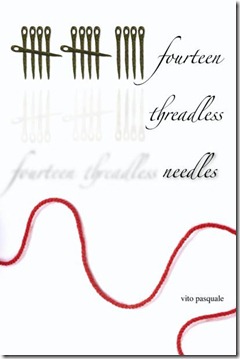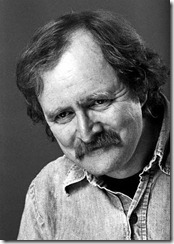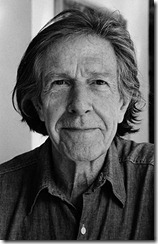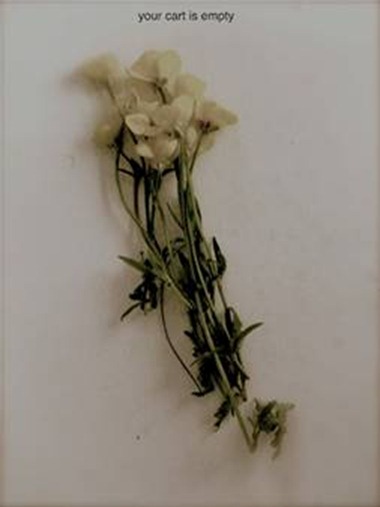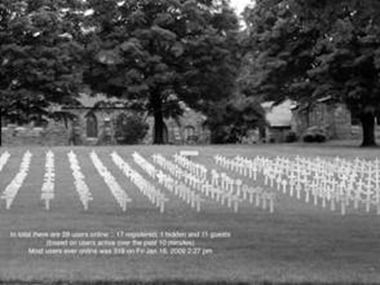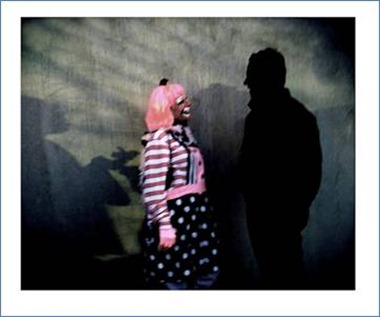A journey of a thousand miles often starts with you barking up the wrong tree. . . – Koe Whitton Williams, November 20, 1955
All poems cause side effects – ‘Always Read the Label Before You Read the Poems’, – Vito Pasquale
If love at first sight exists it seems perfectly reasonable to me that friendship at first sight should too. Thinking about my friends throughout the years I usually couldn’t tell you when we became friends; they were suddenly a part of my life and I struggled to remember what my life was like before I knew them. This works much the same online as it does off. Kindred spirits are drawn together. I couldn't tell you when or how I became friends with Vito Pasquale. I’ll have stumbled on his blog or he’ll have left a comment on mine—that’s the way it goes—and the next thing we were friends. We exchanged e-mails. We talked on the phone. We collaborated. So there is no way I can objectively review his poetry collection Fourteen Threadless Needles since my wife and I were both involved from early on in its development. What I can talk about is why this guy’s stuff works for me.
At first I didn’t even know he was called Vito Pasquale. He wrote under the pseudonym Koe Whitton Williams of all things and it was only when an order came in for my second novel under the name Victor Pasquale that he fessed up. It’s not a big deal. Many online these days like to compartmentalise their lives and Vito is not the first I’ve become friendly with whose real name I didn’t know; names are only labels anyway. He started blogging on July 18th 2008, a year after me. His site was called the half-life of linoleum and the first quote that introduces this article was his first post. Many of his early posts read like aphorisms:
Two Kinds of Facts
Koe. . . there's but one kind of lie but two kinds of facts—those that are true and those that are too true.
The Seven Words You Can Never Say in Heaven
Koe: Jesus Christ, what are you doing here?
but it wasn’t long before his first ‘Jilly Nines’ appeared:
At Church with Jilly Nines
Dad (whispering) —"Jilly, you're making a noise when you breathe, it's a little too loud honey."
Jilly—"Does everyone in heaven hear me?"
Dad—"Yes."
J—"Does Grandpa Eric hear me?"
D—"Yes."
J—"Does Grandpa Eric breathe loud too?"
D—"In heaven you don’t really need to breathe, I think."
J— “What do I breathe?”
D—"Air. We breathe air."
J—"Where is it?"
D—"Everywhere."
J—"Where?
D—"All around us."
J—"Is it touching me?"
D—(uh oh)
J—"IS IT touching me?"
D—"It’s everywhere, well not underwater or on the moon."
J—"Is it touching me now?"
D—"Yes."
J—"SHOW ME THE AIR! NOW!"
What is immediately apparent even from these three early examples is that Vito has a way of looking at the world. Jilly's innocence was the perfect foil. She appears again and again, sometimes in dialogues like this, sometimes in narratives:
Everyone at my job is “Bill,” “Bob,” “Ruth,” “Sarah,” “Lester,” “Asshole Trevor,” or “etc.” What I mean is everyone is on a “first name” or “epithet and first name basis.” At school, it turns out that everyone is: Mrs. Greenhild, Mr. Ingram, Mrs. Lipton-Soupmix. I cannot handle this. I have to get on a first name basis with these people in a hurry or I’ll be as afraid to address them as I am to order a double-mocha-cino-mora-java-llada-roma at Starbucks. It’s intimidating. I just want to be able to say to Jilly’s teacher, “So, Julie are we having fun learning?” or “Jules, are we up to speed on the shape shifting thing yet?” (I do plan to refer to Jilly as “we” in school as I am prepared to take 100% responsibility for everything related to "our" schooling because there is no way she is getting away with the stuff that I got away with.)
from ‘First Contact’
A collection of ‘Jilly Nines’ pieces is in the works, tentatively entitled Tasting Ants.
Tasting Ants
“Daddy.”
“Yes, Jilly?”
“Hannah did a bad thing at school.”
“What was that honey?”
“She deaded something.”
“Oh dear.”
“She was tasting ants for recess, and she deaded one by accident.”
“Tasting ants?”
“Yes. On a spoon.”
“Was anyone, a teacher, watching her?”
“Miss Maya-Sara.”
“Did she see her tasting the ants?”
“She only saw Hannah dead the ant. The daddy ant.”
“How did you know it was the daddy?”
“It was the slowest runner.”
“What did Miss Maya-Sara do?”
“She took away the spoon Hannah found.”
“Did she say something?
“She was talking to Robert, who wanted to walk up the slide and climb down the ladder.”
“Oh.”
“That’s wrong. Am I right?”
“What honey?”
“Walking up the slide.”
“Yes. It’s probably dangerous.”“. . .”
“Jilly?”
“Yes daddy.”
“Did you taste the ants?”
“No. I did not have a spoon.”
Most of Vito’s early pieces were prose or at least prosaic—his early published works were all short stories (in the eighties he was published in the likes of Scholastic's Co-Ed magazine and the Sunday New York Times Westchester Weekly)—but it was pretty obvious, even from the start, that there was a poet a-hiding in there.
The first ‘poem’ arrived a few months later, on September 30th:
Four Score and Seven Therapists Ago
My first acting role, I am reluctant to
Admit, was in a Geek-sploitation film.
I had a speaking part in a
Geek crowd scene.
My line: “Look out Isaac Newton,
We’re on a rampage.”
The director was a very verbose
Woman in her thirties and
At the time that seemed quite
Old, sophisticated, improbable.
I had trouble delivering my line
To her liking. I had trouble
Taking direction, which is why
I had no other prospects other
Than acting. She said, “Do I have to
Spell it out for you?” And my mind
Was thinking “I T O U T F O R Y
O U” and my lips must have been moving
At the same time because she
Smacked me on the face. WhichHelped with my delivery
But is also why in my
First role I have a scratch
Running across my cheek
From the claddagh ring that
Her boyfriend gave her.
Your fifties is late to start writing poetry but there’s no such a thing as too late—my wife started at forty-eight (“seriously” she adds)—and Wikipedia has a whole article on late bloomers but this is what Vito had to say on the subject:
Working on such a compact scale (most of my poems are short) lets me, any writer, work towards finding the few dozen words or so that can explode off the page. A poem is like a dive off a high cliff. I think if I had found poetry twenty years earlier, I would never have stopped writing [for many years he had a very demanding job] but perhaps that isn't true. Perhaps I just was not prepared to write twenty years ago.
Okay I put ‘poem’ in inverted commas. That’s not because I don’t think this is a poem but because, firstly, I think there will be those out there who don’t, but, secondly, and more importantly, I’m not so sure Vito would worry that much and I’m with him there. I personally don’t think it matters. Labels give us an excuse to judge: Yes, it’s poemy but it’s not really that poemy. Do you think it’s poemy? Yes? No? How does one tell? Anyway I put this to him:
Jim: Like me a lot of your poetry could well be classified as antipoetry (as exemplified by Nicanor Parra, i.e. “prose-like, irreverent, and
illuminating the problems of human existence”). Is that a fair comment? Does it matter to you?
Vito:It is a fair comment. "Prose-like, irreverent, and illuminating problems of human existence" is a mantle I am more than comfortable wearing. Two years ago I wrote a poem with one of Parra's lines in it. His line was: "Nobody reads poetry nowadays," from the poem ‘Stop Racking Your Brains’. My Poem was called ‘Steal This Poem’ (which I borrowed, more or less, from Abbie Hoffman'sSteal this Book):
Steal This Poem
My new friend Martin told
this story during a break at
our creative writing group:
"I told my wife, I was
hoping someone would
steal a poem from
me tonight. The market
seems right, the stimulus
package not working,
people ostensibly quicker
to cast ethics overboard,
widespread looting."
"She said, 'Nobody reads poetry
nowadays, even realpoets*
know that.'"
"But," I told her, "I find that
I don't care if they read them
as long as they steal them."
"'Because?' she asked."
"Because anything worth
stealing today,
might
someday
be
worth
buying."The antipoetry tag matters to me in that I think it an incredible compliment for a person to consider another's work long enough to enjoy it and to think about where it might fit. So, I thank you. And, I think you have it right. I suppose I could make a long list of the things I don't consider when I write and it would probably be a fairly good fit with the list of things one should consider when writing a poem.
Parra was not the first writer that jumped to mind when I read Vito’s stuff. It was actually Richard Brautigan. Not his prose so much as his poetry:
Jim: I see a touch of Brautigan in your writing. How do you feel about that? Come to think of that how do you feel about Brautigan?
Vito: I am thrilled that you see a connection. I attended summer classes in English one year while in high school and had what would prove to be the best teacher of my life. I will never forget what we read over those six weeks: J. B. by Archibald MacLeish, Waiting for Godot, The Chosen by Chaim Potok and The Abortion: An Historical Romance by Richard Brautigan. All had a great influence on me, although it's only Beckett and Brautigan that I have continued to read over the years. I wrote the poem ‘The New Calendar’ with Brautigan's calendar in Trout Fishing in America in mind. He writes: "I like best tomorrow: the black, soundless watermelon days." The poem, ‘Behind the Scenes at the Penance Factory,’ is my attempt to have Robert Frost meet Richard Brautigan. I can only hope that I succeeded in that.
The New Calendar
Monday: No more than one per month. Will
usually follow a Friday.Tuesday: Every fourth day will be a Tuesday.
Wednesday: Will follow every other Tuesday
and precede every third Thursday.Thursday: Every fifth day will be a Thursday,
unless it's a Tuesday.Friday: The year will start and end on a Friday.
The ninth day of every month will be a
Friday, even if it's a Tuesday.Saturday: The last time we talked was on
a Saturday. The sky was filled with lightning
and misconceptions, the dogwoods
had gradually gone red and I thought
I'd finally been born. Your eyes were
gleaming. I would have followed
your tears to the bottom of the ocean
but you didn't cry. I did.Sunday: Every day that isn't some other day is
a Sunday.
It can also follow Saturday, if ever there is another.Jim: And your other literary heroes?
Vito: A friend gave me Another Roadside Attraction by Tom Robbins in 1975 and I've read almost every word he's written since. I think everything I write is partly informed by Monty Python's Flying Circus and by the composer Steve Reich, attempts to bring together wit, minimalism and repetition. I think of ‘The Poem of the Seven Veils’ as something I'd look to have Graham Chapman read
Poem of the Seven Veils
Veil
Veil
Veil
Veil
Veil
Veil
Veil
Veil [1][1] The story of my life: eight veils.
and ‘I'll be Jack if You'll be Jill (and if neither of us actually has to break anything)’ as a homage to Steve Reich, with the repeating line, “too many times”. I also should mention Robert Frost because he was the poet that was most often taught to us in school and I frequently find myself in awe of a line of his that I wasn't even aware of a day earlier. He sneaks up on me now and again. There are others: Kay Ryan, Galway Kinnell, Joseph Heller, Donald Barthelme...
Jim: Most of your poetry is slight. In an e-mail to me you once said, “I've always been interested in how little of a 'thing' is still the 'thing.' And when you take enough away—when does the thing become something else?” Care to expand on this?
Vito: This has to do with how I attempt to create (and not bore people with providing too much context, which can be one of my tendencies). One of my favourite paintings is Malevich'sWhite on White. I feel that there is an intense beauty in taking almost everything away, such that what is left is the most concentrated form of the original idea. Fourteen Threadless Needles is about relationships and the passage of time. Early in the book, in ‘A Poem for You’, the 'writer' maintains, rather conventionally, “it's a poem, it has to have words. . . ” and the subject of the poem responds, “Not in my book.” The writer is off the hook, no longer needing words. It's a breakthrough, if you will, in our relationships, no longer needing words.
I once wrote a poem which perhaps only works online. The text is as follows:
Is this white type on a white background, or is it something else?
I think it works well because it is either nothing, or, if the reader regards the blank space in something other than a passive way, she or he is rewarded for participating in the work. It needs the reader to take action to complete. In this case I took away all the words in order to give the reader something else.
If I were to take away all of the notes in a piece of music, we'd have 4' 33" of silence; when John Cage did it, it was much more than silence. That's perhaps my goal, to have my silences or wordlessness or the blank page be as meaningful as my sounds or words or images.
Jim: That strikes me as a very Beckettian thing to say. He said once:
Most writers waste people’s time with too many words. I’m trying to reduce everything down to the minimum. My last work will be a blank piece of paper.
Vito: Exactly. If I'd had a different career it might have been as an archaeologist, stripping away the layers of time to find, what no one, including myself, knew was there.
After a while of posting just text Vito began to upload photos and gradually the images started to overshadow his writing (at least that’s how it felt online) but appearances can be deceptive as we have seen; because something is not online doesn’t mean it doesn’t exist. He has still been writing, simply not posting. In fact he removed almost all his poems and I’ll come back to that in a minute. But I thought first of all I’d address his growing interest in photography:
Jim: I wrote recently:
Poems are flat.
Poetry’s not.What are your thoughts? Photos are also flat. If poems are an attempt to capture poetry then what are photos capturing?
Vito: Photos attempt to capture certainty.
I interpret what you've written as: Poetry's the sum of all poems and poetic ideas; poems written and not yet written and never to be written. Poetry's perfect. Poems are not. Poems contain wonder because of the human attempt to attain perfection, to complete the eternally incomplete "Poetry." And we can appreciate poems for both the attempts at perfection as well as their inherent imperfections, their almost imperceptible graininess trying to displace all that flatness.
Of course, I might have that all wrong, but If I were to think analogously to what you've written, I might say Photographs are flat, Photography's not. I think the world is flooded with, and our lives overflow with, uncertainty. Who knows what one is going to 'get' when one begins a work of art or a photograph or a poem for that matter? Who knows what one is going to 'get' on any given day?
Photography then, by my imperfect analogy, is perfect. It is a visual recording of every moment, everywhere, at every scale, at every angle, with every nuance, in all contexts. And I think all that a photograph attempts to do is to capture certainty in one little moment and place and we can appreciate photos for both the attempts at perfection as well as the inherent imperfections, their unfortunately perceptible graininess trying to displace all that uncertainty.
Jim: You’ve started incorporating words into your most recent photomontages. What are you aiming at with this blurring the boundaries between writing and art?
Vito: Readers are impatient, especially online. Some people read four words and are gone. It's challenging to get someone's attention in four words (although we try and. . . fail, sometimes).
I think the same person in an art gallery tends to be more patient, if for no other reason than she or he has invested some time to get there and it takes time just to move your body through the space. ‘Your Cart is Empty’ (one of the photo montages) means one thing if you're blazing through Amazon but it means something entirely different (I think) on the wall of a gallery, with an image of a child's handful of little yellowed, yellow flowers on a sepia-coloured, old-looking wedding invitation, mottled paper background. Think about it, "Your cart is empty." E.M.P.T.Y. There is nothing in it. Not a thing. You have nothing in your cart, it's white on white. You are now invited to observe that "Your cart is empty." How can you stand it? "Your cart is empty."
Also, people who go to galleries tend to be with someone else and in that setting people are more likely to say to each other. . . something: "What do you suppose that means?" or "I like those yellowed yellow flowers," or "What cart?" or "This does nothing for me." All of which are incredibly interesting to me. So, I guess this blurring of boundaries is mostly about how readers and viewers will interact with the work, the images and words, an attempt of mine to get into a different venue. Even if the venue is still online, I like the idea that one can hide words in images and can make juxtapositions that are perhaps more poignant than just the words, 'your cart is empty,' or just a photograph of yellowed yellow flowers. I rarely have favourites in my own work but the image and text of ‘untitled no. 5.28.12’ affects me differently every time I look at it. It's as if someone else did it.
CLICK ON THE IMAGE FOR A CLEARER PHOTO
Jim: So why did you close the half-life of linoleum?
Vito: I'd made a few great friends from writing and posting photos and concept pieces on ‘the half-life of linoleum’ and part of me is sorry that I closed it but I was just done with it. The reason I started to delete posts was that some were designed to be somewhat ephemeral and then I got carried away. It's not true of course that anything put on the internet ever truly 100% disappears but now, the old work mostly exists in the google readers of those who followed the blog. When I think about it, it's kind of a neat place to 'exist.' Only in memory.
There is an article on the Poetry Foundation website about William Bronk. You can read the whole article here but this quote made me think of Vito:
I don’t remember a single individual Bronk poem, and I don’t know if they’re actually memorable; anyhow, they don’t matter to me in that way. For me they’re like the small brown bottle my grandmother carried in her purse and sniffed for the pick-me-up jolt.
This is very much how I feel about Vito’s poetry. No, I couldn't rattle one off now to save my life but that said I doubt I could recite one of my own poems and get it word perfect. There is memorable and there is memorable. Old poems with regular rhythms and strong rhymes are so much easier to commit to memory than modern free verse. I don’t think that it’s a fair comparison.
In an interview on Paula Cary’s site the poet Angela Veronica Wong wrote this:
When I organize a manuscript of poems, I look to create a narrative arc through the collection—of course I want each poem to stand alone, but I also want there to be a conversation that the poems are having with each other. I am interested in how each poem is changed or affected by the other poems that are included in the book.
This was the problem that faced Carrie, Vito and myself when we started looking at the poems he had kludged together to form a collection which, at the time, he was going to call Behind the Scenes at the Penance Factory. There was no apparent order to them but to my mind the only natural order that poems have is the order in which they were written. I pick up my big red folder and that’s as close to an autobiography as I’m ever going to write. Vito’s poems came without dates although that’s really neither here nor there as memory isn’t linear. But as I pawed through the sheets it was obvious to me that there was an underlying narrative beginning in 1969. Did you notice the asterisk in the poem ‘Steal this Poem’? It designates a neologism. There are more in the opening to ‘Over Near the Dictionaries 2’:
We wrote our initials in the OED
on page 1969 in honour of the
year, SNH on the left, VJP on
the right. We added some words
we knew to be missing. I added
windowsilliness,* and you,
seductionitis.*
This is where ‘they’ first meet, “in the library” and where their courtship begins. Of course the ‘they’ is a composite ‘they’ comprised of numerous women and the woman the narrator is sitting at a table with in ‘Love’ may not be the girl in the library, the woman whose bed he’s hiding under in ‘Stray Cats’ or the woman suffering from Alzheimer’s in ‘The Persistence of Laundry’. Vito accurately describes the content in the blurb:
Fourteen Threadless Needles is a poetry collection about a lifetime of relationships, the relationship of a lifetime and the awareness that 'Something there is that doesn't love a happy ending.' Poems about love, sharing, laughter, forgetting, second guesses and a poem for you:
A Poem for You
— I want to write a poem for you.
— Um, okay.
— Can you pose for me, sitting in this chair in the sunlight?
— Why?
— I need to be able to see you clearly—to describe you perfectly.
— Should I take off my clothes?
— You don't have to. It wasn't going to be. . .
— What if I want to?
— If you do, I'll never get to the poem.
— That's okay isn't it?
— Well, I kind of had my heart set on writing a poem.
— Can't you change your mind? Your heart?
— Can I do the poem first?
— Only if it's nonabstractly unambiguous about the state of my undress.
— I don't think I have the right words with me. I left them home by accident.
— Then. Don't. Use. Words.
— It's a poem. It has to have words.
— Not in my book.
When Vito was posting regularly I was always delighted to see his blog highlighted in my feedreader and I was never disappointed. Many of his pieces are slight, almost inconsequential but the cumulative effect is what you have to look at. Some authors are better represented by collections than others and I think Vito is one of them.
His photography—the best of his photography (especially the photomontages)—has the same flavour as his poems. They are, in effect, visual poems. Poetry is much bigger than poems. Poems are containers in which we try to capture poetry and I believe the same is true with photographs. Both poems and photos provide us with small, still moments when we are faced with giving meaning to something outwith ourselves. What, for example, does ‘Pink’ mean?
Vito has had a number of exhibitions of his photography and one up and coming:
- ‘Some Things We Both Might Have Missed', Mount Kisco Public Library, Oct 2012
- ‘Fourteen Threadless Needles’, The Gallery at Still River Editions – Jan-Mar 2012
- Hudson Valley Medical Center, Group Show, Sept 2011
- Ossining Public Library, Group Show, June 2011
- R. T. S. Gallery, Group Show, April-May 2011
- ‘A City of (Second) Guesses’, Harrison Public Library, Jan-Feb 2011
- ‘Mount Kisco in 4.8 seconds’, Mount Kisco Public Library, Jan 2011
- Greenburgh Public Library in spring 2010
You can buy a book of his photograph here and you can find his poetry collection here in paperback or here as an ebook.
I found, however, that I couldn’t remember how we decided on the title for the collection so I asked Vito to remind me:
I liked the title because Carrie picked it and that was fantastic, that she'd thought about it enough to pick a title. You told me when she read the book that she laughed out loud once or twice—which thrilled me as well. I had been using Behind the Scenes at the Penance Factory as a working title but I thought it was perhaps too. . . something. I am still considering the line I came up with to support the title, 'Love is penance for the sin of wanting to be loved.' Someday, I will write that down.
Threadless Needles are useless except perhaps for causing pain. The term 'Threadless,' as I used it, was a criticism that I'd delivered to myself. A couple of years ago, I was looking back through 'the half-life of linoleum,' to see if I could find a common theme and mostly I could not. . . my work was, to my mind, threadless.
Threadless, perhaps. Pointless, no.
Work available online:
Words
Images
***
 Vito Pasquale lives in New York State with his wife and two young sons. He worked for Reader’s Digest from 1983 to 2008 and since 2008 he has been serving as operations director for QSP, a division of Time Inc. He spent almost a fortnight trying to think of something else to say about himself and came up blank. I have no idea what that says.
Vito Pasquale lives in New York State with his wife and two young sons. He worked for Reader’s Digest from 1983 to 2008 and since 2008 he has been serving as operations director for QSP, a division of Time Inc. He spent almost a fortnight trying to think of something else to say about himself and came up blank. I have no idea what that says.
